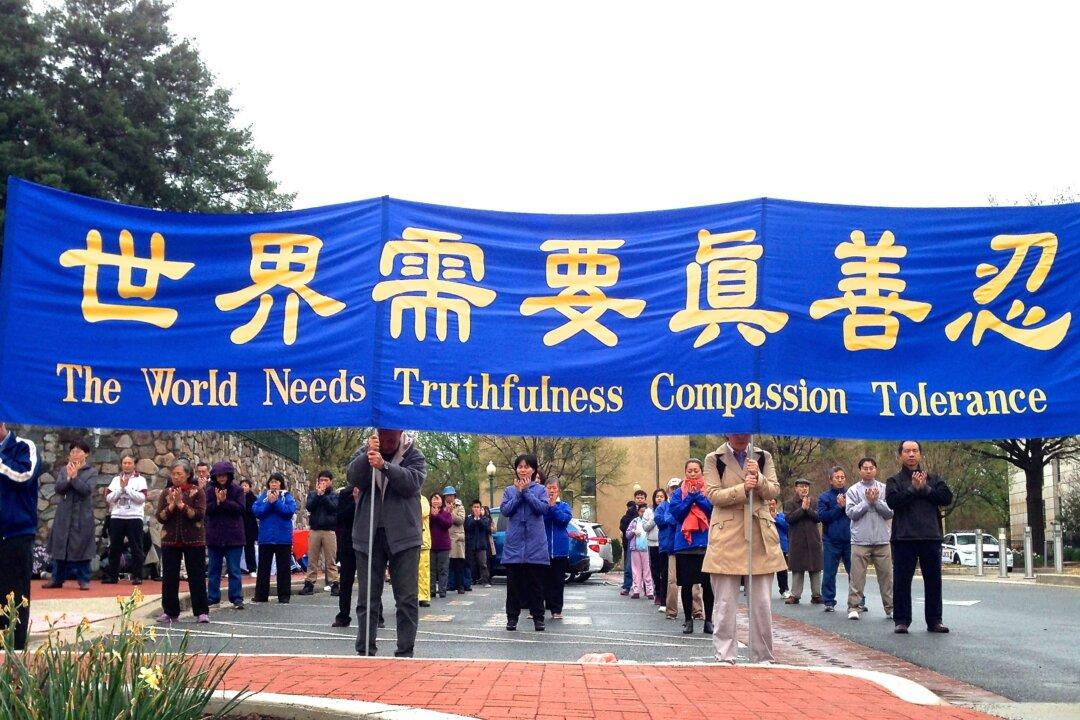WASHINGTON, D.C.—Falun Gong practitioners from the Washington metropolitan area converged on Friday evening in front of the embassy of the People’s Republic of China to mark the 15th anniversary of the day that 10,000 adherents of the spiritual discipline appeared outside the Chinese regime’s Appeals Office in Beijing.
The group in D.C. practiced Falun Gong’s slow motion, meditative exercises together and had a reading, played music, and took part in a candlelight vigil.
Jin Pang, from Gaithersburg, Maryland, read a statement that had been published in the Chinese edition of Epoch Times.
Translated into English, Pang said: “For the past 15 years, Falun Gong practitioners’ methods of clarifying the truth regarding the persecution have evolved. But the underlying principles have never changed from as they were peacefully and rationally expressed on April 25, 1999. Falun Gong practitioners have been doing this persistently, spreading the truth tirelessly and selflessly for 15 years all over the world.”
Falun Gong, also known as Falun Dafa, is an ancient Chinese spiritual discipline in the Buddhist tradition. At the core of Falun Dafa’s teachings are the principles of truthfulness, compassion, and tolerance, which practitioners takes as a guide for their daily life.
April 25: A Turning Point
On April 25, 1999, more than 10,000 Falun Gong practitioners emerged out of the morning fog to present their case to the central Appeals Office. Police directed the crowd to the sidewalks on the streets ringing the compound housing the offices and living quarters of the Chinese Communist Party leadership, known as Zhongnanhai. The crowd would stand there peacefully and silently the entire day.
The day before 45 practitioners had been arrested and beaten in the nearby city of Tianjin. Practitioners felt the event in Tianjin was an escalation in efforts by local officials around China to suppress their practice. They had gathered that day in Beijing to ask for the release of those arrested and for a safe and legal environment for the practice of Falun Dafa in China.
Nothing like this demonstration had ever happened before in communist China.
The large number should not have been surprising. By the regime’s own count, there were 70 million to 100 million Chinese practicing Falun Dafa.
The then-Premier Zhu Rongji, who was the official head of the Appeals Office of the State Council, personally came out and met with practitioners. Five representatives were selected to speak with Zhu and officials from Beijing and Tianjin. They agreed to practitioners’ requests to have the practitioners in Tianjin released, and a cessation of hostilities toward the practice. With that happy resolution, the practitioners went home as quietly as they had appeared.
However, on the evening of that same day the General Secretary of the Chinese Communist Party (CCP) Jiang Zemin wrote a letter to the Standing Committee of the Politburo, the small group of 7 that ruled China, charging that there must have been secret agents planning and issuing commands to the 10,000. He expressed alarm at the large number practicing Falun Dafa and at how members of the Party and the security forces were taking up the practice. And he cast the principles of the meditation practice as a threat to the atheist and materialist ideology of the CCP.
Jiang “unified” the opinions of the Standing Committee, whose members opposed suppressing Falun Dafa. In a speech on June 7, Jiang repeated the charges about foreign influence, saying the April 25 incident was the most serious incident since the Tiananmen Square protests in 1989. This speech was transmitted as a secret document inside the Communist Party.
More ominously, on June 10 Jiang established an extra-legal Party body, which would henceforth be called the 610 Office, with the purpose of eradicating the practice of Falun Dafa.
Persecution
In the early morning hours of July 20, the regime began a wave of arrests of Falun Gong practitioners all across the nation.
Practitioners who have been arrested have been told repeatedly by their jailers that Jiang Zemin had given orders to “Destroy their reputations, exhaust them financially, and eliminate them physically.” The guards have also said they had been assured that if someone was beaten to death, the death would be counted as suicide.
According to the Falun Dafa Information Center, at any one time hundreds of thousands of Falun Dafa practitioners are detained in China. Over 3,600 deaths from torture and abuse have been confirmed, although the Information Center believes the true death toll is much higher. In addition, independent investigators believe tens of thousands of practitioners have been murdered as their organs have been taken for use in transplantation.
“The Party has used coercion, imprisonment, torture, and systematic vilification in an effort to force anyone known to practice Falun Gong to recant the basic tenets of his or her peaceful faith,” according to the Falun Dafa Information Center.




